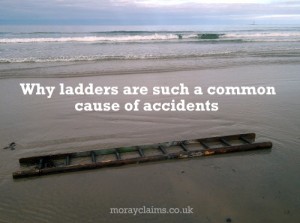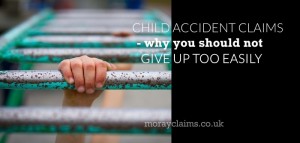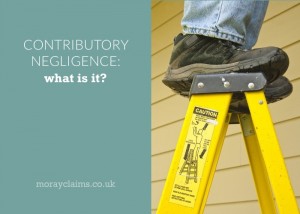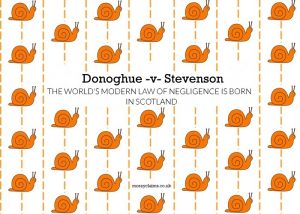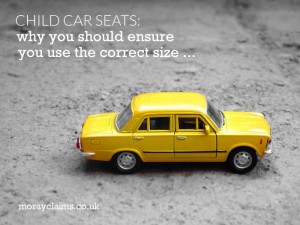National Geographic has put the Moray Coast in the top twenty of its world list of the most beautiful coastal regions. This should be good news for tourism in Moray and the North of Scotland. The article – which is available on the National Geographic Travel website – emphasises the area’s outstanding cliff scenery and strong community feeling. It has been formulated from opinions from a panel of 340 experts in sustainable tourism taken together with views of readers on the locations of the Earth’s most scenic coastal regions. Comments from readers included that the Moray Coast is: "A wonderful region of Scotland - beaches are fantastic, and the area welcomes visitors as one of their own.” Continue Reading
Accidents at Work – Loss of Earnings
Where you have been injured in an accident, a common consequence is that you will not be fit for work for a period of time. We often find that our personal injury clients who are victims of accidents in the workplace - in situations where it was the employer's breach of duty that caused the accident - only decide to make a claim at all because during their absence they receive wages at a reduced rate. It seems unfair that not only have you been injured due to your employer's fault but you then also suffer a personal / family financial crisis. Some employers have a company sick pay scheme, usually set out in the employee's written terms and conditions. If you have the benefit of a scheme like this, it will often mean you getting full pay for some weeks or months, then half pay, eventually reducing to nil. If you are injured and there is no employer's scheme in place, you may still be eligible for statutory sick pay (SSP), the standard weekly rate for which is currently £85.85 Continue Reading
Accidents on Rural Roads
RoSPA - the Royal Society for the Prevention of Accidents - published a policy paper (August 2010) addressing the safety of rural roads, which could be of interest to you if you have suffered personal injury on the roads in Moray or elsewhere in the North of Scotland. The publication points out that rural roads have not seen as rapid a fall in accident rates as urban areas in recent years. Rural roads still account for over 70% of fatal road accidents. RoSPA is of the view that simply managing the road environment itself can help to reduce the number of incidents where the road is a primary or indirect cause of the accident. According to RoSPA, some useful options are to alter the perceived road width with markings or roadside islands or by changing or removing the centre line. "Forgiving roadsides" can also help reduce the risk and severity of injury sustained if a vehicle leaves the main carriageway for a short period. If you have been injured in a road accident then Continue Reading
Legal Expenses Insurance: one method of funding your personal injury claim
If you have had an accident and been injured, you may have insurance cover for the cost of instructing a solicitor that you didn't even know you had. Most of us hold some form of insurance - household (buildings or contents), medical, car, holiday - the list is endless. Many such policies have Legal Expenses Insurance (LEI) as an add-on, often buried in the small print. If you need to make a personal injury claim following an accident, LEI is one way of funding your claim. Others are "no win - no fee" and, in Scotland, Legal Aid. There can also be similar cover through bank accounts, credit cards and bank / organisation memberships. Some of us at Moray Claims / Grigor & Young are members of the Association of Personal Injury Lawyers (APIL) and they have produced a helpful downloadable pamphlet which includes discussion about these issues. How we can help We can help you determine whether this type of funding - or any of the others - would be available to help you Continue Reading
New Injury Claim Value Guidelines Promote Gender Equality in Scarring Cases
When you receive compensation from a personal injury claim, in most cases, there are damages paid for losses beyond the personal injury itself, such as loss of earnings or replacement of damaged clothing. The claim for the pain and suffering associated with the injuries is known under Scots Law as “solatium”. In England and Wales, the term used is “general damages”. We value the claim for solatium by finding reports of previous cases from the courts where the claimants had similar injuries. In general terms, the valuation depends on the nature of the injuries sustained and the length of time it takes you to recover from them. Valuing personal injury claims is not a straightforward exercise because no two cases are ever precisely the same. Yet justice requires that there should be consistency between awards. It is now 20 years since the first publication of the Judicial Studies Board (“JSB”) Guidelines. The JSB Guidelines are in booklet form and are the result of the deliberations of Continue Reading
Ladder Accidents
[NOTE: This article also forms the basis of a podcast episode - "Ladder Safety Hazards" - available on this website. If you prefer to listen to this content rather than read it, please go to the podcast audio] Ladders are surprisingly dangerous. The introduction to the Health and Safety Executive’s (HSE) publication “Safe Use of Ladders and Stepladders – An Employer’s Guide” (link to PDF - download begins immediately) confirms that: “A third of all reported fall-from-height incidents involve ladders and stepladders. On average this accounts for 14 deaths and 1200 major injuries to workers each year. Many of these injuries are caused by inappropriate or incorrect use of the equipment.” There is a reported instance of someone suffering a fatal injury after losing their footing on the second rung of a ladder, falling backwards and hitting their head on the floor. Unfortunately, judges have a tendency to regard ladder use as requiring nothing more than common sense. As a Continue Reading
Child accidents: why it can be a bad idea to prejudge your chances of success
If you have been injured in an accident and you think it was partly or wholly your fault, it might discourage you from making a claim at all. You need to remember that negligence is a legal concept. Injured people who think they are legally to blame for the accident which caused their injuries are often wrong. It is always worth getting legal advice from a specialist personal injury solicitor. Where the injured person is a child, often it can appear that they have been foolhardy in their behaviour. Cases in which children have climbed onto things and fallen or otherwise hurt themselves are nothing new to the law. In a case from the year 2000, the eminent judge, Lord Hoffman, pointed out that the law appreciates that the ingenuity of children “in finding unexpected ways of doing mischief to themselves and others should never be underestimated”. Lisa Wardle made a claim against Scottish Borders Council on behalf of her nine-year-old daughter. This was after her daughter fell Continue Reading
Contributory negligence: what is it?
By definition, contributory negligence can only come into play where your claim is going to be successful. The insurance company dealing with the claim will have accepted 'primary' liability and, in doing so, they accept they have to pay you some compensation. However, they want to restrict how much they have to pay to you and contributory negligence is one way they can try to do that. It means they are saying the accident or the injuries you have suffered were partly due to your own fault. This could be because: you did not take proper care when crossing the road and that was part of the reason for you being knocked down; you tripped over something you ought to have seen, if you had been taking reasonable care; you did not wear a hard hat on a construction site and you were more seriously injured than you would have been otherwise when something fell on your head; or as per the photograph at the top of this article, you were injured due to Continue Reading
Donoghue –v- Stevenson: the world’s modern law of negligence is born in Scotland
If you have an accident claim in Scotland, it is covered by the Law of Delict. In England, it is known as the Law of Torts. The modern law of Delict – covering the duties people owe to others not to cause them injury - can be traced to a particular case, arising from an incident which occurred in Paisley on Sunday, 26 August 1928. The case of Donoghue –v- Stevenson is widely known in legal circles, not just in Scotland and the UK but throughout the world, as the source of the modern law of negligence. A night out in Paisley On the evening in question, May Donoghue, at that time a 30-year-old shop assistant, boarded a tram in Glasgow for the thirty-minute journey to Paisley. At around 8.50pm, she and a female friend took their seats in the Wellmeadow Café in Paisley’s Wellmeadow Place. The café owner, Francis Minchella, took the order and May's friend ordered, and paid for, a pear and ice, and an ice-cream 'float'. Mr Minchella brought the order and poured part of Continue Reading
Child car seats: another reason to make sure it’s the right one
It’s bad enough to be involved in a road traffic accident in which someone is injured ... ... but it is even worse if that person is a young child. As a parent, you will find it difficult to come to terms with an injury to your child even if the accident was not your fault. What follows is the facts of a case from 2012 where a mother – who was driving the vehicle in which her injured child was a passenger – was not responsible for the accident at all but was still found to be partly responsible for her child’s injury. In this accident, there was a collision between two cars near Wrexham, North Wales. The driver of the other car lost control of his vehicle and it crossed to the wrong side of the road. There was nothing Louise Williams could do to avoid the crash. The driver of the other car was killed. Ms Williams’ daughter, Emma, aged three, was seriously injured. In the back of Ms Williams’ car, there were two child seats. One was a child seat fitted with a harness (for Continue Reading
Your personal injury claim solicitor: the difference between winning and losing?
Terence Connelly suffered a serious injury to his arm. He fell while playing tennis on a carpeted court at a leisure centre in Renfrew. One of his feet got stuck in the surface and he fell heavily. It appears that he had on the wrong kind of tennis shoes. It turned out there was a special type of shoes he should have been wearing, though he did not know that at the time. Mr Connelly made a personal injury claim against the leisure centre. He pointed to the fact that, following the accident, signs were put up at the centre stating: “Non-marking smooth-soled tennis shoes on carpet courts”. His action was unsuccessful in the Sheriff Court before first the Sheriff and then on appeal to the Sheriff Principal. He further appealed to the Court of Session but that appeal also failed. He conducted all three hearings in the case himself. In essence, the claim was unsuccessful because the various judges did not feel able to say that, on the available evidence at the date of the Continue Reading
Your future accident at work claim at risk
In a press release on 13 November 2012, the Association of Personal Injury Lawyers has highlighted a proposed change to Health and Safety at Work that threatens to return Scotland to Victorian times. The amendment of Section 47 of the Health and Safety at Work Act 1974 would alter laws that have been in place since the end of the 19th century. As the law stands, if a worker is injured and he or she can show the employer is in breach of health and safety regulations, there is a right to claim compensation. The proposed changes will mean an injured person would no longer be able to rely on this right but would have to start from square one and prove that negligence had occurred. It seems inevitable that this change will mean employers’ liability cases becoming more complex - and so more expensive to run. Many legitimate claims could be denied redress in future, leaving people injured at work having to rely on their families and the State to support them rather than the insurers of Continue Reading


